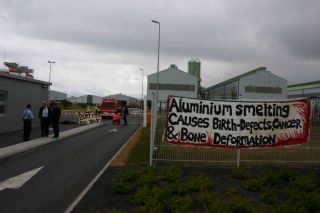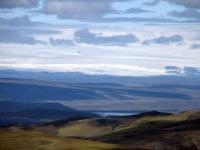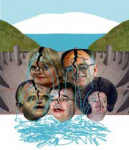'Rio Tinto Alcan'
Tag Archive
Dec 15 2008
ALCOA, Krafla and Þeistareykir, Landsvirkjun, Rio Tinto Alcan
Rio Tinto Alcan has taken back it’s plan to enlarge it’s aluminium smelter in Straumsvík, Hafnarfjörður, according to the Icelandic newspaper
Fréttablaðið. Alcoa’s planned smelter construction in Bakki (north-Iceland) will also be delayed for the next years. Landsvirkjun (national energy company) and Þeistareykir hf. have agreed to discuss with other interested buyers of geothermal energy in the north of Iceland.
Last Wednesday, Jacynthe Côté, Rio Tinto Alcan’s director, told Össur Skarphéðinsson, the minister of industry, that the company’s planned 40 thousand ton enlargement in Straumsvík would not take place. The enlargement was planned to take place in 2009, inside the company’s already declaired zone. The smelter’s production capacity would have raised from 185 thousand tons to 225 thousand tons.
Read More
Nov 11 2008
Economic Collapse, Jaap Krater, Landsvirkjun, Rio Tinto Alcan, Tungnaá
Landsvirkjun, Iceland’s national energy company, has announced that the tender offer of the dam
Búðarhálsvirkjun will be delayed because of the current economical situation. This means that the planned expansion of Rio Tinto Alcan’s aluminium smelter in Straumsvík will also be delayed. Construction of
Búðarhálsvirkjun, which was stopped a number of years ago, will dam the Tungnaá River, close to the lake Langisjór.
The construction of Búðarhálsvirkjun is expected to be around 25 billion ISK and the 85 MW dam is supposed to power R.T. Alcan’s increased production in Straumsvík, Hafnarfjörður. R.T. Alcan hopes to increase its production by 40 thousand tons per year without enlarging the smelter. But the company also hopes to enlarge the smelter further, though the people of Hafnarfjörður voted against it in a 2007 referendum, or to construct a new smelter i Thorlakshofn. The dam is also meant to create power for Verne Holdin’s data center to be built in Reykjanesbær. Read More
Nov 01 2008
Actions, ALCOA, Bauxite, Corruption, Guinea, Mining, Rio Tinto Alcan
In Guinea, West Africa, people have stopped trains from Compagnie des Bauxites de Guinee (CBG) that move bauxite from mines to the harbors. Bauxite is the major raw material for aluminium production and Guinea is the world’s biggest bauxite exporter. The protests started yesterday morning, October 31st and have been increasing since than.
Protesters have been seeking out officialdom´s houses, robbed them and put fire to many houses. At least one woman died during riots that resulted from the actions. Today, the protesters have managed to stop many trains interrupting the transport of bauxite, which is the country’s biggest export product. Read More
Oct 29 2008
ALCOA, Century Aluminum, Economic Collapse, Economics, Heavy Industry, Rio Tinto Alcan
The men who made Iceland go cap in hand to the IMF are now bent on ruining its landscape
Björk, The Times – After touring for 18 months I was excited to return home a few weeks ago to good, solid Iceland and enjoy a little bit of stability. I had done a concert there earlier this year to raise awareness about local environmental issues and 10 per cent of the nation came to it; but I still felt it wasn’t enough.
So when I returned I decided to contact people all over the island who had attempted to start new companies and bring in new greener ways of working but had not succeeded. For a long time Iceland’s main income was fishing, but when that become uneconomic people started looking for other ways to earn a living. The ruling conservatives thought that harnessing Iceland’s natural energy and selling it to huge companies such as Alcoa and Rio Tinto would solve the problem.
Now we have three aluminium smelters, which are the biggest in Europe; and in the space of the next three years they want to build two more. The smelters would need energy from a handful of new geothermal power plants and the building of dams that would damage pristine wilderness, hot springs and lava fields. To take this much energy from geothermal fields is not sustainable. Read More
Oct 26 2008
3 Comments
ALCOA, Century Aluminum, Economic Collapse, Economics, Energy Prices, Jaap Krater, Kárahnjúkar, Landsvirkjun, Norsk Hydro, Rio Tinto Alcan, Saving Iceland
Jaap Krater, Morgunblaðið, 26-10-2008
In times of economic crisis, it is tempting to embrace new megaprojects such as new power plants and aluminium smelters. But will this realistically improve Iceland’s economic prospects?
Prime minister Geir Haarde recently explained on Stöd 2’s chat show Mannamál that one of the main reasons for the fall of the Krona, was due to the execution of heavy industry projects: the construction of Kárahnjúkar and Alcoa’s smelter in Reyðarfjörður. If more large projects are executed, what will the cost be for the Icelandic taxpayer?
Haarde’s comments were not surprising. Before construction of Kárahnjúkar many economists predicted the negative impact on inflation, foreign debt and the exchange rate of the ISK.
Of course there is some economic benefit from new smelters, but “it is probably outweighed by the developments’ indirect impact on demand, inflation, interest rates and the ISK exchange rate,” stated a report by Glitnir in 2006 on the impact of aluminium expansion in Iceland. The report expected an increase in inflation and a depreciation of the ISK.
“Kárahnjúkar will never make a profit, and the Icelandic taxpayer may well end up subsidising Alcoa,” said the eminent economist Thorsteinn Siglaugsson after publishing another report on the profitability of the Alcoa dam in East Iceland before construction commenced. Read More
Oct 26 2008
ALCOA, Andri Snaer Magnason, Century Aluminum, Economic Collapse, Economics, Hengill, Kárahnjúkar, Landsvirkjun, Reykjavik Energy, Rio Tinto Alcan

Andri Snær Magnason, Fréttablaðið – In these turbulent times interested parties use the opportunity to offer us “solutions” and relief. This time around it involves “alleviating all restrictions” and putting public energy companies up as 300 – 400 milliard collateral for two to three new aluminium plants. This is what is on the drawing board when the total debt of OR and LV (the central public energy institutions) are already at a dizzying 550 milliards – mostly because of Alcoa and Norðurál (Century Aluminum). This is why the banks always preached large-scale industry policies – more debt – more joy. It’s down to the price of aluminium to repay these loans, but aluminium prices are plummeting and a level of overproduction has already been reached. The nation believes that the magic term EXPORT EARNINGS is money that will end up in the nation’s pocket. News of export earnings and foreign currency receipts have time and again been directly false and treacherous. A bar chart published in the Morgunblaðið newspaper the 11th of October depicts the aluminium industry as more important than the fishing industry and considerably larger than the tourism industry. But the presentation is exactly as the INTERESTED PARTIES would like to have it portrayed in the media. When Alcoa Fjarðaál claims to export for 70 milliards a year, most Icelanders believe that this is currency that we can use.
Read More
Oct 26 2008
Bauxite, India, Mining, Orissa, Rio Tinto Alcan
INDIA – Unfazed by the global economic slowdown, international mining behemoth Rio Tinto is seeking to develop bauxite mines as a prelude to investing about $2.2 billion for a greenfield alumina refinery and 250.000 tonne smelter plant in India, its top official in the country said.
“We are interested in getting bauxite mines which may enable us to further the process of setting up the alumina refinery and smelter plant,” Rio Tinto’s India Managing Director Nik Senapati said while unfurling his company’s plans in the country. The London-listed company is believed to be the world’s biggest producer of alumina and aluminium. Read More
Oct 26 2008
Actions, ALCOA, Bakki, Bauxite, Century Aluminum, Mining, Repression, Rio Tinto Alcan
CONAKRY, GUINEA – At least one person was killed when police in Guinea cleared protesters from a railway carrying bauxite for Russian aluminium company RUSAL, police and industry sources said on Friday the 10th of October. RUSAL, after it’s merger with Glencore, is the largest owner of Century Aluminum, which owns the Grundartangi smelter in Iceland and has been preparing to construct a new smelter at Helguvik, south of Reykjavik. The trains, which have been blocked for five days, had still not restarted, the sources added. Read More
Oct 24 2008
ALCOA, Arms Industry, Century Aluminum, Cultural, Economics, Repression, Rio Tinto Alcan, Workers Rights
“They are saying in the paper every day, let’s throw up these aluminium smelters because of the economic crisis. This is a bad idea because in a way building smelters is part of the economic crisis. These huge loans that companies take is too big a chunk for the Icelandic economy to pay. We are on an economic roller coaster ride right now,” said Björk in a recent interview with ITN news.
Read More
Sep 29 2008
Andri Snaer Magnason, Arms Industry, Bauxite, Geothermal Energy, Greenwash, India, Media bias, Or, Pollution, Rio Tinto Alcan, Saving Iceland, Vedanta
By Snorri Páll Jónsson Úlfhildarson, orignally published in Morgunblaðið
“Do you know that your wheelchair is made out of aluminium?” said a police officer to one of those who stopped work in Helguvík this summer. Thereby he swamped all the arguments of the opposition to aluminium for good, didn’t he? Shortly after the publication of Jakob Björnsson’s (former director of energy affairs) article about the singer Björk Guðmundsdóttir and her usage of aluminium, the editors of Morgunblaðið got ready and wrote an editorial where it says that the opposers of aluminium are probably not self-consistent most of the time. Most of them use aluminium everyday and even Saving Iceland cooks in aluminium pots and uses aluminium polse to hold up their tents. “Hypocrisy” said Morgunblaðið.
This critique is far from being new. It has systematically been used against those who object to the further build-up of heavy industry here in Iceland, the destruction of Iceland’s nature for energy production, the destruction of ecosystems worldwide because of bauxite mining, and energy realization to a company that prides itself of its collaboration with the U.S. millitary. In addition to when aluminium opposers are all said to be wanting to move the Icelandic society back to the turf huts and build the country’s economy on picking mountain grass, this has been the main criticism.
No matter how many times it has been pointed out that at least 30% of all produced aluminium is used for the arms industry; no matter how many times it has been pointed out how much aluminium ends as a land-filling after having functions as single use drinking facilities; no matter that the context between low energy prices and the fact how easy it is for us to produce aluminium, use it once, throw it away and produce more – still we are being told that we are not self-consistent.
Read More






